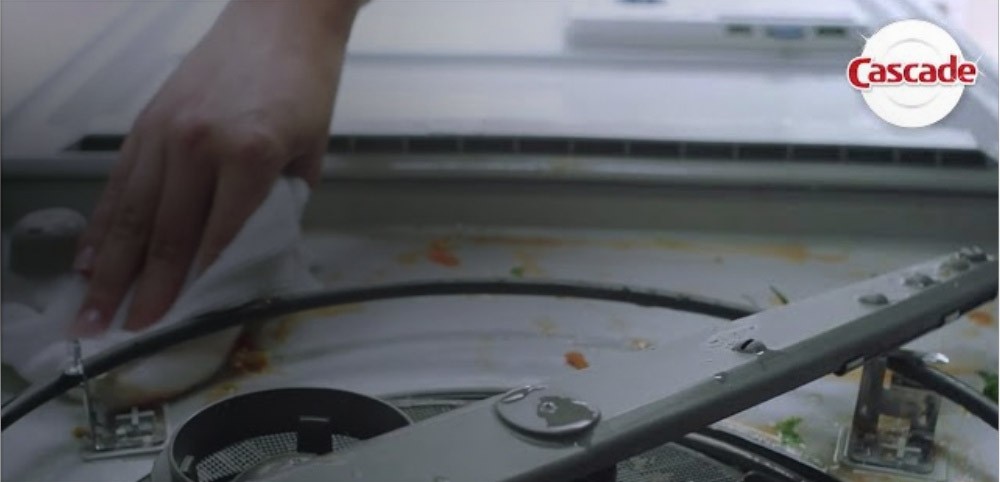Opening your dishwasher to a foul odor can be off-putting. That musty smell isn’t just unpleasant; it can indicate underlying issues and potentially affect your dishwasher’s performance. Understanding “Why Does Dishwasher Smell” is the first step to resolving the problem. This guide will explore common causes of dishwasher odors and provide practical solutions to eliminate them, leaving your appliance fresh and clean.
Common Culprits Behind Dishwasher Odors
Several factors contribute to a smelly dishwasher. Identifying the source is crucial for effective cleaning:
1. Trapped Food Particles:
Food debris is the most common cause of dishwasher smells. Leftover scraps can get lodged in various parts of the dishwasher, including:
- Spray Arms: Check the holes in the spray arms for blockages.
- Filter: Most dishwashers have a filter at the bottom that traps food particles. This needs regular cleaning.
- Door Gasket: The rubber seal around the door can accumulate food debris and grime.
- Bottom of the Dishwasher: Inspect the bottom for any visible food remnants.
2. Grease Buildup:
Grease from dishes can accumulate on the interior walls and components of the dishwasher, leading to a rancid smell. This is especially common if you frequently wash greasy dishes.
3. Mildew and Mold Growth:
The warm, humid environment inside a dishwasher is ideal for mildew and mold growth, especially if there’s standing water or poor ventilation. These can cause a musty odor.
4. Hard Water Deposits:
Hard water can leave mineral deposits inside the dishwasher, contributing to odors and potentially hindering its cleaning efficiency.
5. Dirty Dishwasher Filter:
A clogged filter restricts water flow and traps food particles, leading to unpleasant smells. Regularly cleaning the filter is essential for preventing odors.
Banishing Bad Dishwasher Odors: Effective Cleaning Solutions
Once you’ve identified the potential source of the smell, you can implement these cleaning solutions:
1. Remove Visible Food Debris:
Thoroughly inspect and remove any visible food particles from the dishwasher’s interior, spray arms, filter, door gasket, and bottom.
2. Clean the Filter:
Remove and clean the dishwasher filter according to the manufacturer’s instructions. Typically, this involves rinsing it under running water or using a brush to remove debris.
3. Deep Clean with Vinegar:
Place a cup of white vinegar in a dishwasher-safe container on the top rack and run an empty cycle on the hottest setting. Vinegar helps to remove grease, grime, and mineral deposits.
4. Baking Soda Scrub:
Sprinkle baking soda on the bottom of the dishwasher and let it sit overnight to absorb odors. Then, run a short, hot cycle.
5. Air Dry Regularly:
After each wash cycle, leave the dishwasher door slightly ajar to allow for air circulation and prevent moisture buildup. This helps to prevent mildew and mold growth.
6. Use a Commercial Dishwasher Cleaner:
Periodically use a commercial dishwasher cleaner to remove stubborn stains, grease, and limescale buildup. Follow the product instructions carefully.
Preventing Future Dishwasher Odors
Preventing odors is easier than eliminating them. Follow these tips for a consistently fresh dishwasher:
- Scrape Dishes Before Loading: Remove large food particles from dishes before placing them in the dishwasher.
- Run the Dishwasher Regularly: Don’t let dirty dishes sit in the dishwasher for extended periods.
- Clean the Filter Regularly: Clean the filter at least once a month, or more frequently if needed.
- Address Spills Promptly: Wipe up any spills or food debris immediately.
- Use a Rinse Aid: Rinse aid helps to prevent water spots and mineral buildup, which can contribute to odors.
By understanding the causes of dishwasher odors and implementing these cleaning and prevention strategies, you can keep your dishwasher smelling fresh and operating efficiently.
